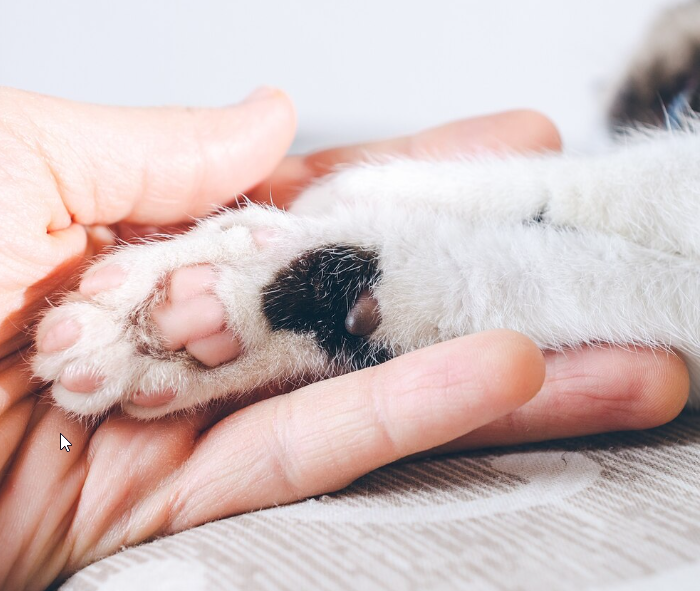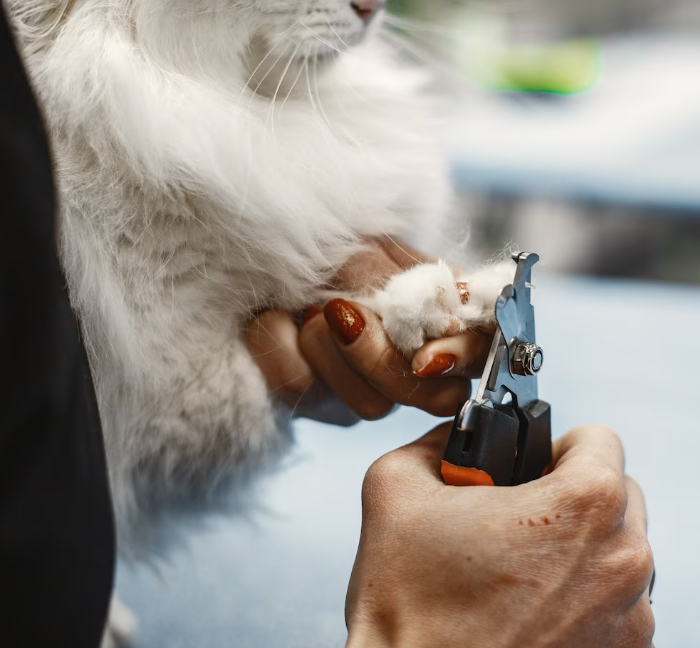2024-05-13
Most cat owners gradually get used to the funny and peculiar behaviors their feline friends exhibit. They are cats after all, aren’t they? They are supposed to be gorgeous, unique and surrounded by myths and legends that some cat parents might secretly hope to be true!
Talking about peculiar behaviors, nail biting is likely to be considered such by many people, as it is something we associate with humans and not so much with animals. However, it is a fact, that cats bite their nails for different reasons. As most behaviors, biting their nails might be absolutely normal, which is a part of their nature and evolution; on the other hand, there might be medical reasons for it, so in some cases, it should not be overlooked.
Let’s find out what is likely to cause our feline friends to bite their nails and when we should seek medical assistance.
Cats’ nails consist of layers, the outer one of which gets worn out over time. When applying pressure to the claws by using them in their daily life for climbing or other activities, small ruptures start forming on them. After some time, when there are many small cracks on the claw, the outer layer falls off. This is a natural process, which helps the tips to remain sharp and prevent the claws from getting stuck in the surfaces or objects the cat has been in contact with.
In case, the outer layer has not fallen off entirely, and there some small pieces dangling off, your paw friend may use their teeth to remove them. Having sharp nails is important for cats, isn’t it?
We and our paw friends are very alike in some aspects of our behaviors! Just like humans keep their nails clean and neat, so do our feline friends.
Cats are known for their inquisitive nature and willingness to reach every little corner at home and often outdoors too! If you have an active and energetic little buddy, who walks on various surfaces and tend to accumulate debris on their paws and fur, spending time for some paw and nail grooming is quite normal.
Cats spend most of their waking hours grooming themselves. Licking their fur and cleaning their paws is a natural part of the grooming process, so occasional biting of their nails is perfectly normal.
If you notice that your cat often bites their nails, you may need to provide them with a scratching post or toys to scratch their nails.
If there is a lack of suitable scratching surfaces, your feline is likely to start exploring other ways to keep their nails at a comfortable length, comfortable for them. Scratching also help our feline friends spend energy, do not get bored and reduce stress.
Providing your beloved furry buddy with interactive toys and surfaces to scratch is important for their overall well-being.

Does your cat have enough opportunities to play, chase, climb...engage in activities that keep their mind sharp and their body fit? If your cat is not a couch potato, but an active and energetic furry buddy, then it is your responsibility as a loving owner to provide them with opportunities to spend their energy.
You might consider buying a puzzle, treat ball, cat wand/teaser or improvise! You can make a funny game with obstacles, play find the cup, or let your cat find a hidden treat! There are so many options to keep your beloved paw companion engaged and happy! The following article might give you some good tips: Indoor Activities for Dogs and Cats in Bad Weather.
Excessive nail biting and showing any excessive behaviors in general, might be caused by triggers in the environment. Biting their nails might be a coping mechanism for your feline friend to reduce stress.
Here comes the question- What can you do to help your cat with anxiety? The first thing to do is to identify the triggers in their environment. These could be very loud noises, changes in their routine, diet, environment, home interior, the death of a family member or another pet in the household, moving to a new home...etc.
Mild anxiety can be addressed with creating a routine for your cat and sticking to it, so it brings a feeling of safety and predictability; redirecting their attention through training, exercises and playing sessions; setting up a comfortable area for them, which is cozy, warm and safe (you can add toys, a warm blanket, and your old clothing with your scent on).
Severe anxiety may require vet consultation. Talk to a vet about the possible causes of this behavior and what it can be done if it is anxiety-related.
If you are not familiar with this term, it would be interesting to you to find out what it means! It describes a condition that can manifest in both humans and animals, causing the desire to eat non-edible items.
It might be classified as an eating disorder due to lack of mineral deficiencies or dental problems, but can also be caused by stress, anxiety, or boredom.
If you notice your cat craving for non-edible items, and excessively biting their nails, it is time to consult with a veterinarian.
Parasites such as fleas, mites and ringworms can cause cats to bite their nails and scratch their skin. Usually, the presence of parasites is accompanied by additional symptoms like redness, skin patches of thin hair or hair loss, itchiness, and inflammation.
Keep your feline friend vaccinated and treated against parasites regularly, based on their age, breed and lifestyle.
Even if they don’t look harmful, parasites can cause serious damage and even lead to organ failure and anemia if not treated promptly.
Allergy to certain plants, chemicals or surfaces your cat has been in touch with, as well skin allergies transferred by parasites are possible cause of this behavior.
It is advisable that you check your cat’s paws and skin regularly and make sure they are healthy and do not have signs of irritation, redness or swelling.
Infection of the nails can also cause excessive nail biting. Your paw companion may want to reduce itchiness, relieve pain and discomfort caused by a bacterial or yeast infection.
Some cats, just like humans, are more predisposed to certain diseases and infections than others.
It is important to remember to always cut your cat’s nails very carefully. Do not cut them too short, as you may reach a blood vessel and cause an infection.
Autoimmune diseases such as Pemphigus Foliaceus can cause ulcers and lesions in more sensitive areas of your cat’s body. Toenail beds, paw pads, ears, eyes and sanitary area belong to these areas, so you may need to check them regularly for abnormalities.
Consult a veterinarian immediately, if you notice a symptom of an infection or disease. They will run tests and administer treatment.
Our gorgeous feline friends never stop to amaze us with their beauty and peculiar behaviors. While it can be interesting and fun to watch our cats indulging in their daily routine, we should always keep an eye on any deviations from their standard behavior, routine or physical appearance. This might help us identify a health condition in a timely manner and take precautions.